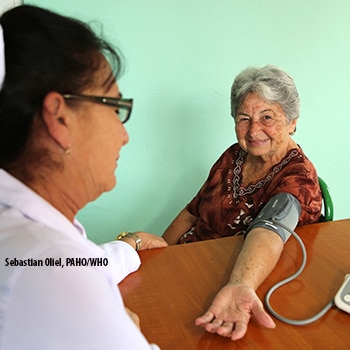Global Noncommunicable Diseases Fact Sheet
Advancing innovative, evidence-based interventions to prevent and control NCDs
Noncommunicable diseases (NCDs), such as heart disease, stroke, cancer, chronic respiratory disease, and diabetes, are the leading cause of death and disability worldwide.
To address this emerging global health challenge, the Division of Global Health Protection (DGHP) works across CDC and collaborates with global partners to enhance global health and economic security and reduce premature NCD deaths and disabilities.
Changing social, economic, and structural factors including more people moving to cities and the spread of unhealthy lifestyles fuel the NCD crisis that kills 15 million people prematurely — before the age of 70 — each year.
High rates of NCDs in low- and middle-income countries cause poverty, inhibit economic development, and burden fragile health systems, making these countries less resilient when emergencies like infectious disease outbreaks or natural disasters occur.
Every 2 seconds, a person dies prematurely from an NCD.
85% of premature deaths occur in low- and middle-income countries.
$47T estimated loss in economic input by 2030.
DGHP’s approach builds on established programs and partnerships to extend our reach and resources, generating scientific evidence, strengthening workforce capacity, and improving surveillance and evaluation systems. These activities are aligned with global targets including the UN Sustainable Development Goals to reduce premature death from NCDs by one-third through prevention and treatment and to promote mental health and well-being by 2030.

Produce scientific evidence on NCDs, risk factors, and interventions to develop effective interventions and enable informed decision-making

Strengthen public health infrastructure and workforce capacity to empower countries to address health needs and avoid health crises

Improve NCD surveillance, monitoring, and evaluation systems to enable countries to set priorities, target interventions, and monitor success
CDC and partners support countries using mobile phone technology to collect representative NCD data, enhancing prevention and response strategies and turning data into action.
CDC works with ministries of health to train disease detectives by integrating NCD training into existing field epidemiology training programs in select countries. Cohorts of NCD-focused field epidemiology residents have launched in China, Ethiopia, India, and Thailand.
CDC supports and co-chairs a global coalition of academic, governmental, and nongovernmental researchers that develops and disseminates peer-reviewed research to inform NCD strategies globally.
CDC and partners support countries in implementing the HEARTS technical package to improve cardiovascular disease prevention and management in primary care. In the Americas alone, over two million adults in 131 health centers across 12 countries have benefited from HEARTS implementation.
Every $1 invested in proven NCD interventions in low- and middle-income countries will generate at least $7 in increased economic development or reduced health care costs by 2030.
Investments in these areas enable countries to make sound policy decisions, enhance global economic and health security, and support progress towards the UN Sustainable Development Goals. Countries with healthier populations are more stable and prosperous, better able to avoid health crises and outbreaks, and more viable trading partners.
